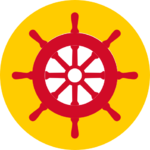Self-Determination Congress
 | |
| President | Julie Lee Mung-yiu (李夢瑤) |
| Chairperson | Andrew Ng Fan-chiu (吳返照) Prime Minister of Nakong |
| Secretary | Robert Wong Kin-kwok (王建國) |
| Founder | Harold Lam Ping-yuk (林秉燭) |
| Founded | 12 March 1938 |
| Merger of | Nakong Paisha Society (1940) All-Nakong Independence Committee (1943) Nakongese Labour Committee (1948) |
| Preceded by | Nakong Liberation Army |
| Headquarters | 23 King William Road Ningcho, North Bay |
| Newspaper | The South Seas Herald-Advocate Nakong Daily |
| Student wing | All-Nakong Student Independence Committee |
| Youth wing | Congress Youth Wing |
| Women's wing | Women's Movement for Self-Determination |
| Membership | 1.67 million |
| Ideology | |
| Political position | Centre-right |
| Colours | Blue, yellow and red |
| House of Deputies | 103 / 144
|
| House of Review | 25 / 41
|
| Local councillors | 794 / 1,123
|
| Party flag | |
| File:Flag of the Self-Determination Congress.svg | |
| Website | |
| www.sdc.nk | |
The Self-Determination Congress of Nakong (Shangean: 内江自決大會黨; SDC) is a major centre-right and Paisha nationalist political party in Nakong. As the ruling party in the Parliament of Nakong since independence, the SDC has long wielded immense power in the nation and maintains its position through an extensive patronage network, influence over the media and systemic advantages that include gerrymandering and public funding.
Initially founded in 1938 by veterans of the Nakong Liberation Army who fought in the liberation of Nakong, the Self-Determination Congress resisted a return to the pre-war colonial situation and promoted the establishment of responsible government in Nakong. Under the leadership of Harold Lam, the SDC merged with several nationalist movements and came to embrace full independence from Estmere. Buoyed by public support for their role in the island's liberation, the SDC became the largest party in the autonomous colonial legislature after the inaugural 1951 election and quickly set out on a path to independence, which they secured in 1958.
Faced with the threat of Shangean unionism after independence, the Self-Determination Congress adopted Paisha nationalism as its guiding philosophy and embarked on a nationbuilding project which minimized the role of Shangean culture in Nakongese history and portrayed Nakong as a culturally distinct society based around the common language of Paisha. To further distinguish Nakong from Shangea, the SDC rejected Zohism as a prospective state religion and instead embraced secularism and cultural diversity as key principles of Nakongese civic identity. Following continuing tensions with Shangea, the Self-Determination Congress adopted a pro-Estmere, pro-Senria position and Lam purged the party's anti-colonial members who favoured closer relations with Coian socialist states. Beginning in the 1970s, the reinvented SDC embraced free-market economics and private investment as the key to the economic development of Nakong, signing free trade agreements with Estmere and Senria, reducing barriers to trade, and encouraging the creation of an export-oriented industrial economy.
Today, the party is led by Andrew Ng Fan-chiu, who has been Prime Minister of Nakong since the 2012 election. The party remains a dominant force in Nakongese politics, holding 103 of 144 seats in the House of Deputies and 794 of 1,123 local government seats, though its electoral monopoly is increasingly challenged by the Democratic Reform Party and other opposition parties.